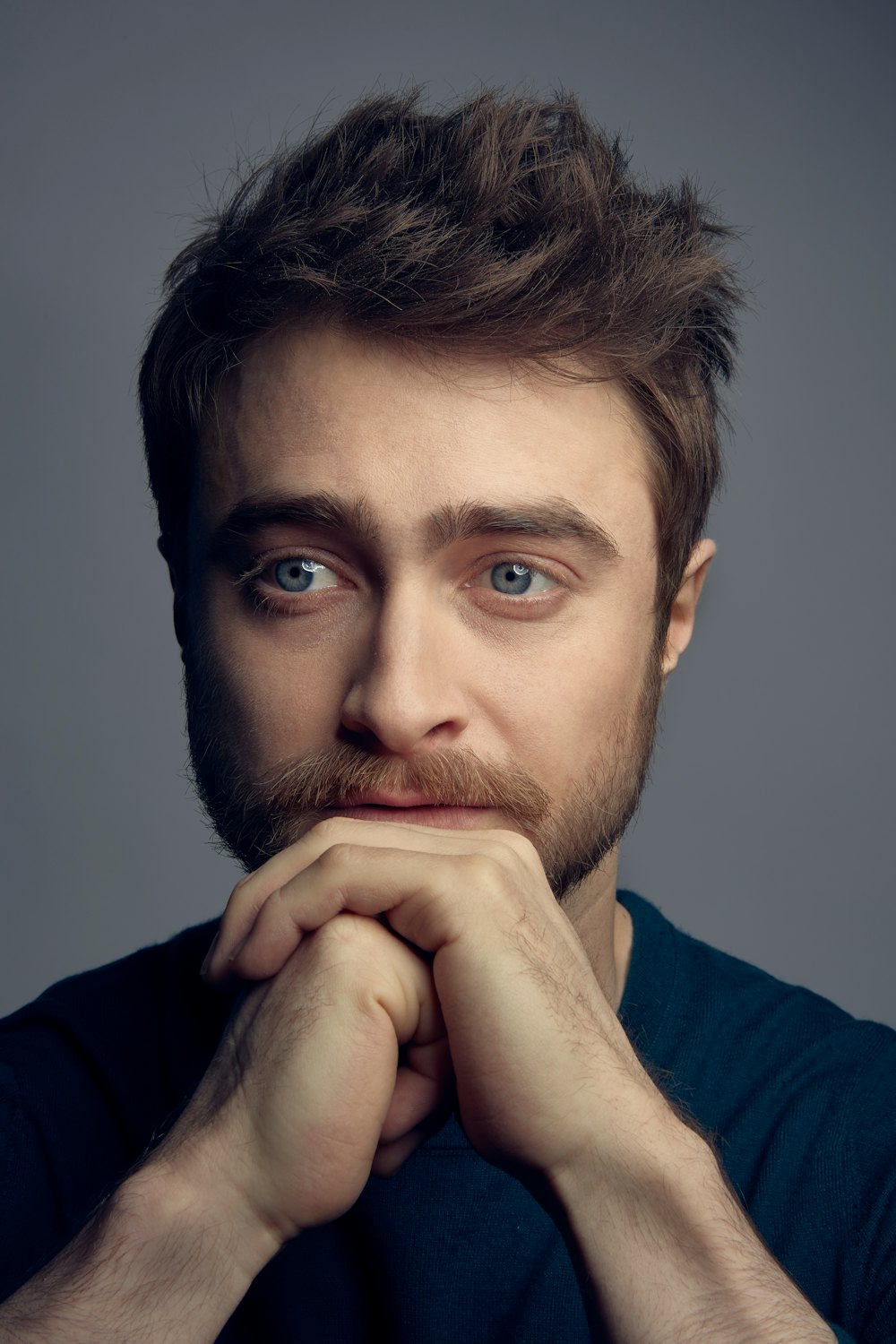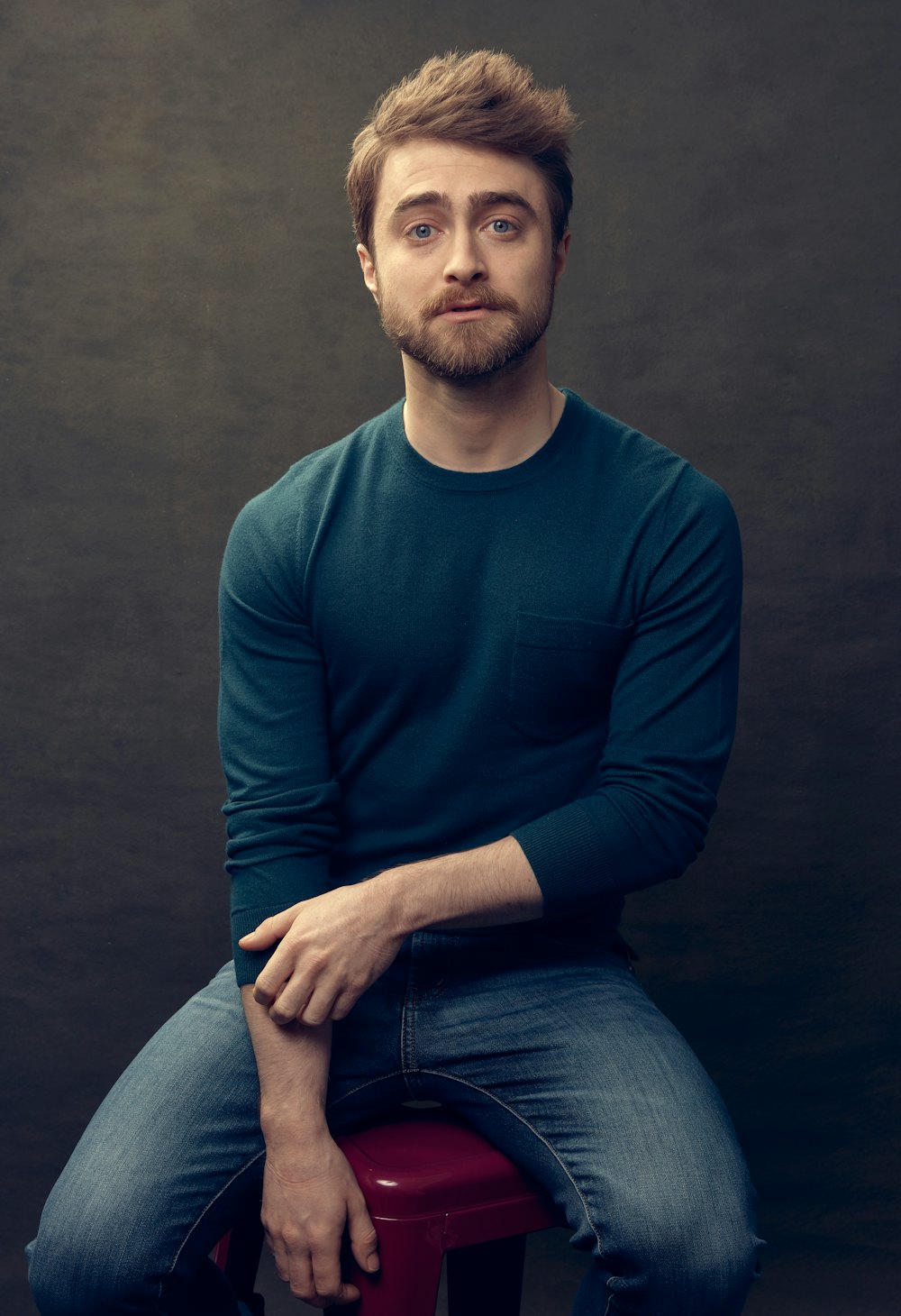Either it’s the cappuccino he downed moments before, or Daniel Radcliffe is really excited to be here. We’re hunkered inside on a particularly frigid January morning, but the 29-year-old actor emanates warmth. There’s an anxious energy that radiates off of him like aerial caffeine, and he speaks with zealous intensity: eyes wide, limbs taut. It’s exactly this quality, I soon realize, that’s endeared him to so many people. Embodying the iconic wizard at the center of the Harry Potterseries at times made him seem larger than life, but in person he’s approachable, effusive, and bracingly unreserved. In less than an hour, we’ve blazed through a half dozen topics most people would take much longer to build to: toxic masculinity, existentialism, questions of fear and failure.
In the years since his star-making turn in Harry Potter, it’s this affability and candor that have come to define who Radcliffe is. There’s an extensive Reddit thread allotted to discussing how rigorously nice he is, and there’s an entire Upworthy post dedicated to the “9 Times Daniel Radcliffe Was The Greatest Human In Hollywood.” It’s not that it’s unprompted: Daniel Radcliffe is enduringly likable, and whether eviscerating the friend zone or skewering double standards, he has a particular knack for doling out the sort of societal hip-checks that can send Twitter into overdrive. But, as Radcliffe points out, none of this is especially impressive.
I think I get a lot of credit because people expect me to be a d*ck.

“People’s image of what a child actor is is often so f*cking terrible that just by being a baseline of decency people are like, ‘Wow, you’re an amazing person!'” he tells me, breaking into a sheepish grin. “And it’s like no, I’m just fine. I’m just not actively an asshole. I think I get a lot of credit because people expect me to be a d*ck.”
He adds that he doesn’t necessarily tire of being praised for doing what he considers the bare minimum. “If the worst thing people are saying about me is that I’m nice, then I’m OK with that,” he shrugs. But there was a time when it weighed on him. Coming off of the final Potter film, Radcliffe was grossly preoccupied with public perception: he’d Google himself chronically, frustrated that critics were fixated on his charisma and not his talent. Initially, he picked roles that were purposefully bold: at 17, he famously starred in Equus, a psychosexual stage drama that required prolonged full-frontal nudity. It was a striking, conscious departure meant to distinguish his capabilities as an actor, but it was just as much about shielding his own anticipated inhibitions.
“If the point of it was to show another side of myself and to show that I could do stuff as an actor that people hadn’t seen before, then doing something safe was not going to show that. Not that you have to go full-frontal. [Your only options aren’t] safe, supporting role or just get your dick out,” Radcliffe laughs. “[But] I think it was about taking certain pieces of ammunition away from critics or the press. You could say that I was bad in Equus, but you couldn’t say that I wasn’t trying something interesting.”


Eventually, Radcliffe stepped back from the internet for his own sanity, let go of his thirst for self-affirmation, and started choosing projects not based on how validating they might be, but how personally fulfilling. “There’s always gonna be a modest chip on my shoulder, but in a way that I think is motivating rather than bitter,” Radcliffe explains. “Towards the end of Potter, I would get asked a question a lot that basically amounted to, ‘So, your life’s over. What are you gonna do now?’ There was always a part of me that wanted to prove to those people that no, you can have a good, fun, varied career after having been famous for one thing for a while. But honestly, my main goal now is a lot less about proving stuff to people and more about just being happy.”
Posing for photos in Bustle’s studio, Radcliffe does have a palpable levity. He’s diligent, yet loose: bopping along to the British rap-rock of Jamie T’s “Sheila,”dropping his shoulders, wagging his eyebrows. He chatters excitedly about his recent discovery of English pop band Superorganism, and how much he “f*cking loves” New York, where he now lives roughly half the year (the other half, of course, in London). He’s spent the last decade acting in a smorgasbord of idiosyncratic art films — an eclectic catalog reflective of his own wide-ranging tastes. He’s a documented fan of Sharknado movies, enjoys indulging in midday Scrabble games and fantasy football leagues, and recently revealed he’s an unashamed Bachelor obsessive. He gravitates toward projects because he’s passionate about them, and because, as he once told NME, he “likes things that do whatever the f*ck they want at all times.”
That includes Miracle Workers, TBS’ heady new afterlife comedy in which he stars as a skittish angel named Craig. The show’s portrayal of heaven is corporatized and chaotic: God (Steve Buscemi) is the apathetic, embittered CEO of Heaven, Inc., and Craig a lowly employee. He works in the long-neglected Department of Answered Prayers, helping mortals to find lost keys and misplaced gloves. The tone is cynical, but silly — a bit of a reprieve for Radcliffe, who, having played a stranded-in-the-Amazon adventurist in 2017’s Jungle and a crunched-for-time cocaine smuggler in 2018’s Beast of Burden, is fresh off a run of somber, high-intensity film roles.

In Miracle Workers, his character is idealistic and pure in heart, a rise-to-the-occasion paladin not unlike the young boy wonder that came to consume his childhood. After God decides he’d rather implode Earth than clean up the mess he’s made of it, Craig and newcomer Eliza (Blockers‘ Geraldine Viswanathan) make a deal with him to try and save humanity: get two mutually smitten but hopelessly awkward 20-somethings to kiss, and the timed detonator will halt the clock. What follows is a haphazard, dispiriting, and often futile venture, but according to Radcliffe, there’s beauty in the attempt.
“It’s certainly a picture of heaven that most people will be like, ‘I hope it’s not like that,'” he concedes. “There are parts of it that are slightly defeatist, but I also think there’s something really joyous in the fact that even amidst all that chaos, there are people in there trying to make a difference and trying to do something really important and help people.”
“The amount of sh*t that had to go right for us to exist if there is no God is miraculous. That is truly something that makes me feel amazed by my own existence constantly.”
As in similarly-minded series like The Good Place and Russian Doll, Miracle Workers raises questions about free will, fate, and purpose without offering concrete answers, but Radcliffe is more assertive in his views. “To me there’s never been anything depressing about [not believing in God] as much as there’s been something liberating. There’s no assigned meaning to life, so you can make it mean what you want it to be for you,” he explains. For him, an absence of faith doesn’t preclude an optimistic outlook. “The amount of sh*t that had to go right for us to exist if there is no God is miraculous. That is truly something that makes me feel amazed by my own existence constantly.”

For Radcliffe, though, the show’s appeal wasn’t so much about probing his place in the world as it was about conveying a deep part of himself he wouldn’t have otherwise been able to express — it’s one of two projects, he says, that reflect his “personal life philosophy.” The first is his so-called “farting corpse” movie Swiss Army Man, a frank-humored 2016 indie that, much as actors do in their art, finds comfort in the power of imagination. The other is this series, an equally strange but more accessible story about believing in good — even in the smallest of increments — amid a world that’s all but abandoned any hope.
“Craig’s miracles are pathetic when you first meet him … [but] the fact that he can [make someone’s] day just slightly better for a moment is more than enough for him, and I think that’s my way of seeing the world,” Radcliffe says. “The world has always been screwed up and will continue to always be screwed up. I have so much admiration for people who wake up in the morning and go like, ‘My mission today is that I’m going to help stop climate change’ or ‘I’m gonna try and solve income inequality.’ For me I just go, ‘I don’t know man. I think the boat might have sailed on that.’ The way I feel most comfortable making a difference is making the lives of the people you are directly in contact with a little bit better every day, just by virtue of being nice or fun or whatever it is.”
It’s a modest sentiment befitting of Radcliffe, who’s spent his career bucking the notion that fame somehow justifies impudence. Hollywood is an insular, often outmoded industry rife with deep-festering problems, but Radcliffe recognizes he might not be the right person to solve them. Instead, he, like Craig, is content to do his part — even if all that means is being kind.
“We feel like we’re in a time of huge turmoil, and we are, and lots of things are changing and it’s very uncomfortable,” Radcliffe says. “But I think the idea that we’re in an especially bad time to be alive right now is just not true. I would still rather be alive at this moment than at literally any other point in history.”
Apparently, it wasn’t the cappuccino after all.
Photos by Justin Bettman
Grooming by Tanya Pacht using Oribe Hair Care and Surratt Beauty

